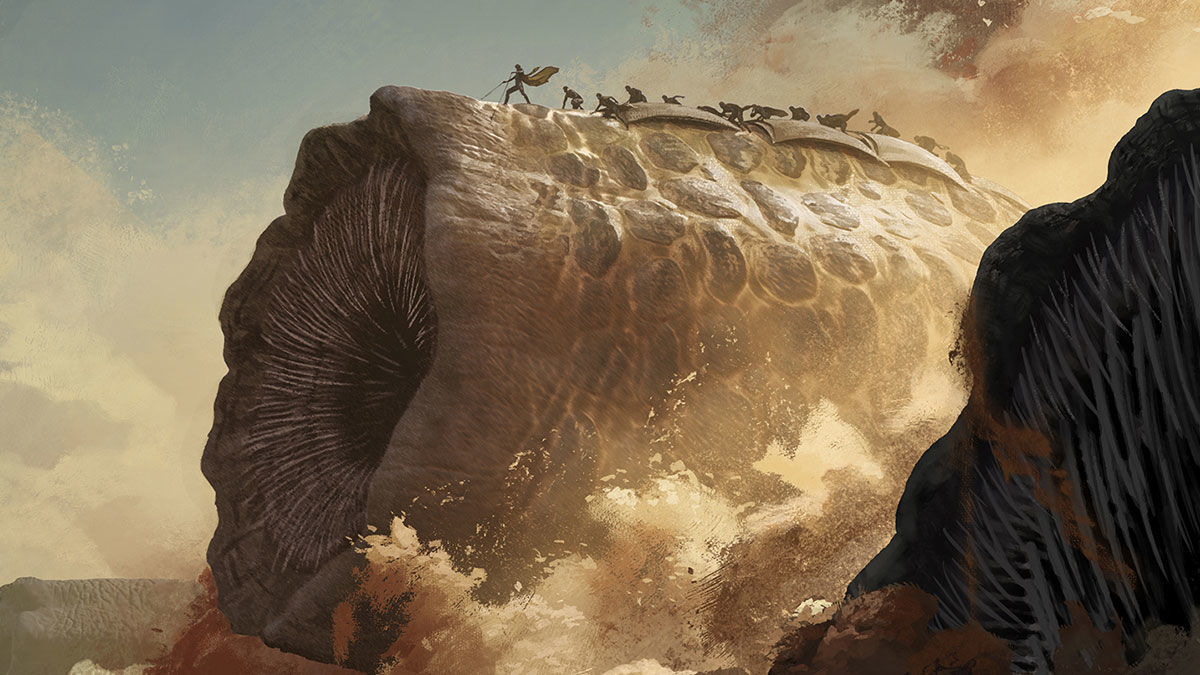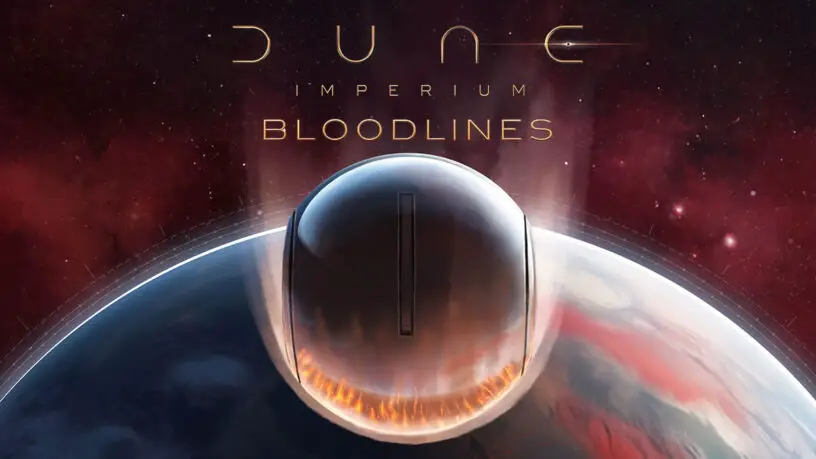This newest expansion can be played with either Dune: Imperium or Dune: Imperium – Uprising base games and has a tech module that’s compatible with or without the CHOAM module. This review is based on two 2-player games, the second one played together with the Immortality expansion.
Bloodlines adds new game components including 32 new Imperium Deck cards, 18 Intrigue cards, nine leaders, two conflict cards, seven Sardaukar commander figures and wood cubes, and 14 Sardaukar commander skill tokens. There are also leader-specific components such as cards, a special board space, and token that are used when playing as Steersman Y’rkoon, Piter De Vries, Esmar Tuek, and Chani. The rulebook specifies how to modify game set-up depending on which base game, which modules, and how many players you have.
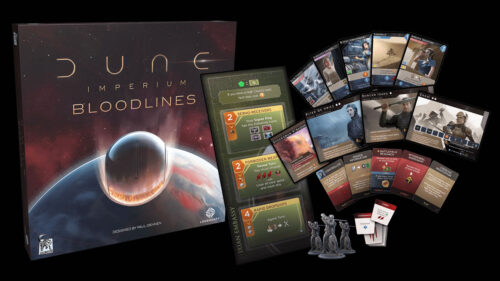
Sardaukar Commanders and Conflicts
The main addition is Sardaukar commanders and associated skills that provide bonuses during the conflict, as well as items like spice. Players can acquire a commander on select board spaces but must pay two Solari to do so, and then must pay the same cost again whenever they wish to deploy a commander in later conflicts. Each time you acquire a commander, you get to choose one of four face-up skills that you can then use whenever a Sardukar commander participates in a conflict.
I mistakenly used these skills during each conflict at the start of the first game before realizing that the commander had to be involved in that conflict. This is why they cost two Solari – to gain access to those skills! I found the Sardaukar were a good addition, as a light change to the game, adding more complexity without having to learn a lot of new rules. Although it might not make sense thematically to have Sardaukar fighting alongside sandworms, we all know any time the sandworms are deployed to the battle, it’s a beautiful sight to behold. Remember that the sandworms double the rewards gained in that conflict.
Bloodlines adds more wild battle icons to conflict cards that can be matched for victory points. This definitely gives another dimension to consider in the conflict phase and makes conflicts more valuable to spend effort on.
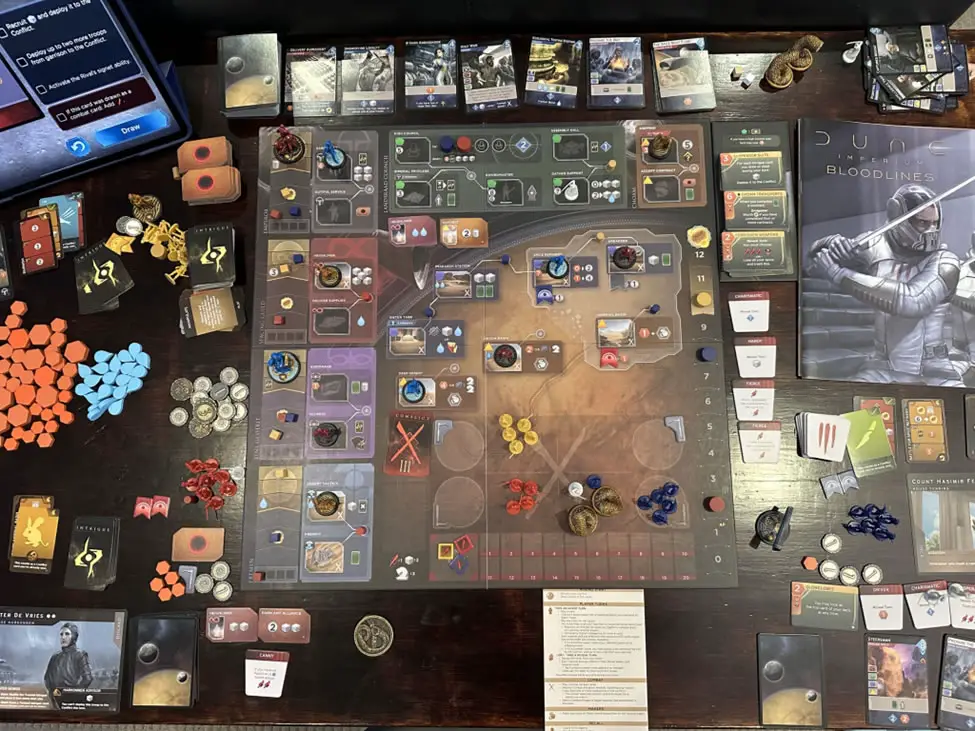
Leaders
In my games, we played with new leaders each time, trying out four of the nine new leaders from the Dune: Imperium – Bloodlines expansion. I played Count Hasimir Fenring and then the Steersman Y’rkoon. I liked Fenring’s ability to trash cards, which helped me keep a nice, lean deck throughout the game and benefit from trashing, but wasn’t as impressed with Y’rkoon’s ability. He gets four Navigator cards, one of which can be revealed any time you achieve two influence with a faction, but the timing for some of these cards’ bonuses didn’t align well with my strategy.
My opponent played with Piter de Vries and Reverend Mother Mohiam. They weren’t amazed by de Vries’ Twisted Intrigue cards, which were generally less powerful than normal Intrigue cards and increased the risk of them reaching four Intrigue cards in hand, meaning they’d have to discard half if I went to the Secrets space on the board. In the second game, they quite enjoyed the enhanced spy abilities of Mohiam.
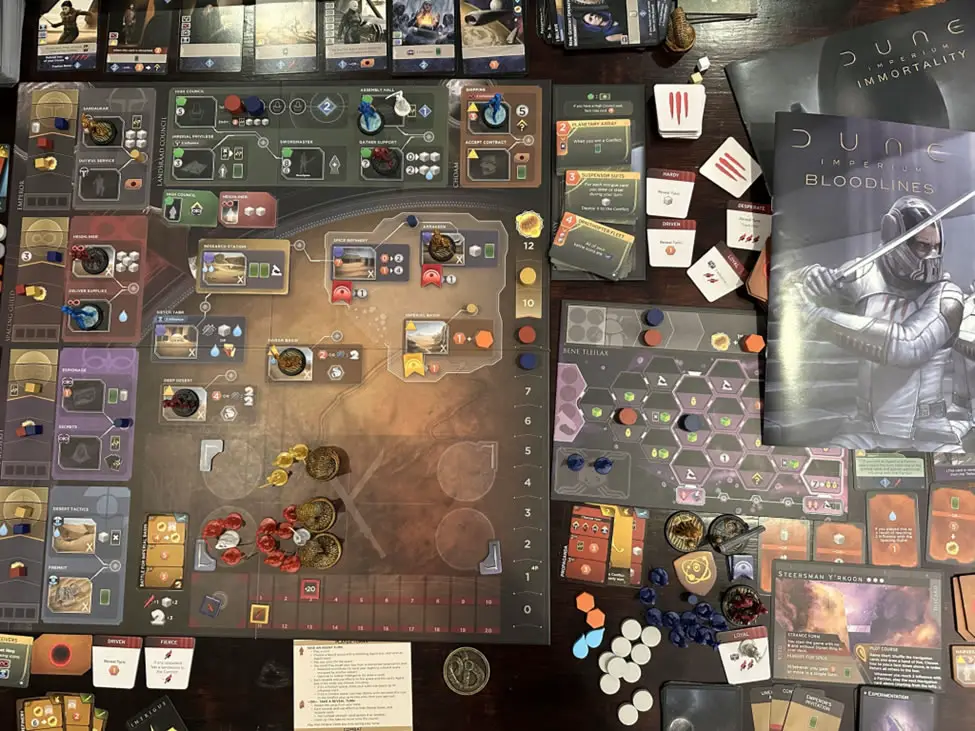
Spies and Tech
We didn’t use the deep cover spies in Bloodlines, but I hope to use them in the future. Deep cover spies allow you to place a spy while ignoring any opponents’ spies, essentially enabling double-up. I still didn’t make as much use of spies overall as I would have liked to, but my opponent did, especially with the Mohiam leader.
The tech module is a mini-expansion themed around Ixian technology and machines. The mechanic was first introduced in The Rise of Ix expansion, but how you acquire tech tiles in this expansion is different. There are a total of 18 new tech tiles and a new Ixian Embassy board where the tiles are placed in equal stacks, with the top tiles visible. Whenever a player goes to a green space, they can also buy a tech tile by paying the cost of the tile in spice. The High Council gives a discount of 1 spice. We didn’t use the tech module a lot but on the second game added a house rule to churn one tile at the same time as the action card Imperial Churn, to ensure we weren’t stuck with tiles neither of us wanted.
Outcomes
Each game took a little over two hours of playtime, after setup, with Bloodlines noticeably extending the base game. Playing with certain leaders required more upkeep and remembering to do things at certain times, but the added complexity of those plus the Sardaukar wasn’t overwhelming. The required third automated player for two-player games, House Hagal (available via an updated app) won both games, which was disappointing! At least in the second game, my opponent was only one point behind them and might have won if I hadn’t sabotaged the conflict for them using an Intrigue card at the last minute.
I enjoyed the Bloodlines expansion, particularly the Sardaukar commanders and skills, and will continue playing with it in future Dune: Imperium – Uprising games when I want more complexity and more choice in the battle arena.
